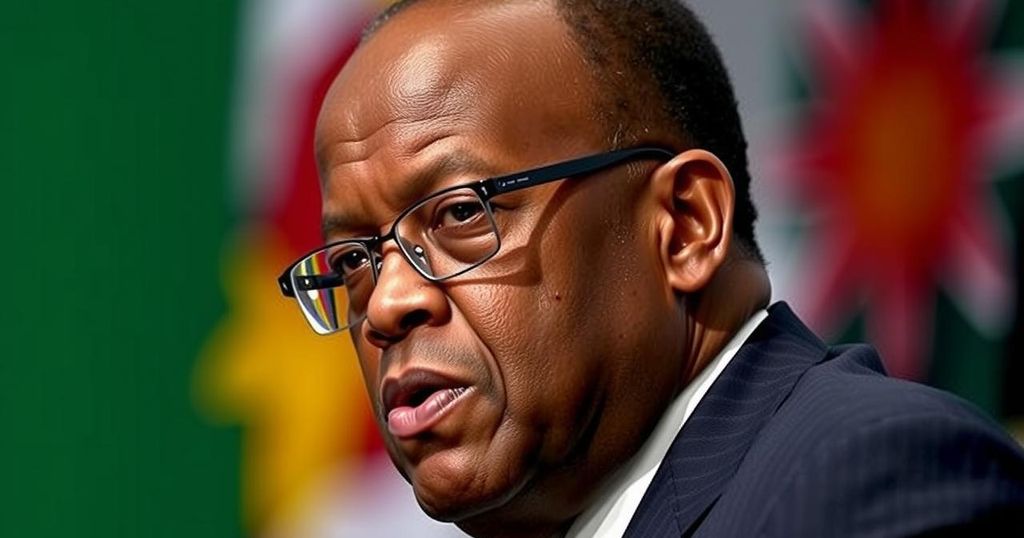Kenya’s Deputy President Rigathi Gachagua was impeached on October 17, 2024, after the Senate upheld five of the eleven charges against him, including threats to judges and ethnically divisive politics. This historic event follows his earlier impeachment by the National Assembly and is indicative of strained relations with President William Ruto. Despite denying the charges, Gachagua is now poised to seek legal recourse while urging his supporters to maintain peace.
On October 17, 2024, Kenya witnessed a significant political upheaval as Deputy President Rigathi Gachagua was impeached by the Senate, following an overwhelming vote in the National Assembly that took place the previous week. This unprecedented event makes Gachagua the first deputy president to be ousted via impeachment since Kenya’s revised constitution was enacted in 2010. Gachagua faced a total of eleven charges, with the Senate supporting five, which included accusations of threatening judges and engaging in ethnically divisive politics, although he was cleared of corruption and money laundering charges. Notably, Gachagua missed the Senate trial due to hospitalization for chest pain, which prompted his legal representatives to express their dissatisfaction regarding his inability to defend himself during the proceedings. This impeachment is rooted in a fallout from Gachagua’s earlier alliance with President William Ruto, a partnership that had secured Ruto’s victory in the closely contested 2022 election. Political strife had recently surfaced, with Gachagua alleging neglect by the president, coupled with accusations of his involvement in protests against government tax policies. This turbulent political climate has raised concerns about the stability of Kenya’s democratic framework amid rising tensions. President Ruto now faces the task of selecting a new deputy within two weeks, and several candidates are suggested by local media, including prominent figures like Interior Minister Kithure Kindiki, Foreign Minister Musalia Mudavadi, and County Governor Anne Waiguru. Gachagua, once a powerful figure in the Kikuyu community, now seeks to contest the impeachment through legal avenues, while also urging his supporters to remain peaceful during this tumultuous period as he reflects on the political betrayal he perceives has occurred. His call for maintaining calm amidst the political storm was underscored during a service in central Kenya, where he appealed for unity, stating, “Let’s preach and maintain peace irrespective of the outcome. Kenya is our country.” With Kenya’s political landscape increasingly volatile, these events signal a crucial turning point for the nation’s governance and democratic processes.
The impeachment of Deputy President Rigathi Gachagua marks a historic moment in Kenya, reflecting the complexities of its political environment. Following the establishment of the revised constitution in 2010, which laid out the framework for impeachments, Gachagua’s removal illustrates an unprecedented legal and political action by the National Assembly and Senate. The backdrop includes a fractured relationship between Gachagua and President William Ruto, compounded by widespread public dissatisfaction regarding economic policies. As Gachagua navigates the aftermath of his impeachment, Kenya’s broader political stability remains in question, revealing the deeply-rooted tensions within the ruling party and the potential for significant shifts in the political landscape.
The impeachment of Deputy President Rigathi Gachagua is a historic event that underscores significant political strife in Kenya. With charges ranging from threats against the judiciary to politically divisive actions, this scenario raises critical questions about the implications for governance and stability in the country. As Gachagua prepares to contest the impeachment legally while urging his supporters to remain peaceful, the situation calls for careful observation of Kenya’s political dynamics in the weeks to come. This event not only impacts Gachagua’s political career but also sets a precedent for future governmental accountability and the functioning of democracy in Kenya.
Original Source: www.jamaicaobserver.com






